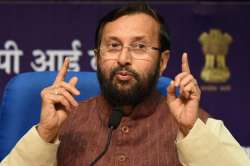HRD ministry wants boards to end moderation policy from 2018, sets up panel
The HRD Ministry has taken the initiative to convince the state boards to curb the "malpractice of spiking of marks" and implement a more scientific moderation policy from 2018.

The Ministry of Human Resource Development (HRD) has taken the initiative to convince the state boards to curb the "malpractice of spiking of marks" and implement a more scientific moderation policy from 2018, a media report has said. This comes as the Delhi high court had last month barred the Central Board of Secondary Education (CBSE) to end the moderation policy because of timing of the decision.
According to a report by the Times of India, the HRD ministry has set up an inter-board working group (IBWG), comprising eight boards, to work out the details for stopping the spiking of marks through moderation. The group has been tasked to work out a model for all boards to follow.
The ministry also wants boards to adopt a common core curriculum. The boards will also upload the grace marks policy on websites and will award grades for extracurricular subjects separately. There is also a plan to share question papers with CBSE to bring about uniformity in assessment, the report said.
"It (the plan to scrap moderation) could not happen as planned this year. However, we are working things out for all boards from next year. In fact, all the boards have agreed to stop spiking marks from next year," a senior HRD ministry official was quoted as saying by the newspaper.
In April, 32 school education boards had agreed not to moderate marks this year, but the Delhi high court restrained CBSE from implementing it. After the verdict, some boards continued with the practice of "inflating the marks".
At the meeting held on April 24, 2017, some boards had raised certain issues about ending the practice this year, but they were in agreement about 2018.
However, school boards in Punjab and Karnataka did not moderate marks this year and adhered to the consensus.
"We have seen that a few boards didn't moderate marks this year and the results reflected that. There are quite a few of them. So that's a start," the official added.
"We have a year's time now to plan and initiate wider consultation as the states are already on board. This is crucial if we are to arrest variations in results which affect students adversely, bring about uniformity in evaluation and improve the quality of education," a member of the IBWG said.
The CBSE had in December last year requested the HRD Ministry to help develop a consensus among all state boards on completely removing the marks moderation policy which is considered as the reason behind inflated scores in board exam results.
Under the moderation policy, examinees are awarded up to 15 per cent extra marks in certain papers if the questions are deemed to be difficult. If the states also decide to adopt the policy, then the soaring cut-offs for admission to colleges are likely to go down.
The CBSE today scrapped the moderation policy on April 24, a decision termed as "unfair and irresponsible" by the Delhi High Court which asked why it could not be implemented from next year.